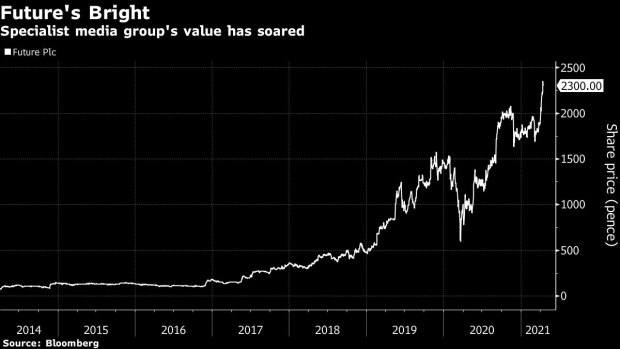Apr 19, 2021
Niche U.K. Publisher to Expand in U.S. After Shares Soar 2800%
, Bloomberg News

(Bloomberg) -- Future Plc boss Zillah Byng-Thorne has transformed a publisher of slightly obscure magazines and websites, including Practical Motorhome and IT Pro Portal, into the best-performing stock on the U.K. FTSE All-Share Index over the last three years.
From its base in Bath, southwest England, Future has shifted beyond its specialist journalism to become a force in global e-commerce, ushering readers from articles about products to the purchases themselves. In November it spent 594 million pounds ($821 million) buying price comparison website GoCompare, while continuing to snap up other well-known magazine brands.
Byng-Thorne now wants to take on U.S. rivals such as Meredith Corp and Hearst Communications Corp.
“There’s significantly more opportunity for us in the U.S. in terms of monetizing the existing audience, never mind growing the new audience,” Byng-Thorne said in an interview. She said they reach one in three people online in the U.S., and their demographic currently skews male. But the acquisition a year ago of TI Media, which owns titles like Byng-Thorne’s own favored read, Country Life, means they can now reach more women.
“Our ambition is to have two in three people online in the U.S. access our content monthly, and that’s very much the focus for the next five years.”
Future’s market capitalization has soared 2,800% to 2.8 billion pounds since Byng-Thorne took the reins in April 2014, vaulting the value commanded by better-known British media groups like Reach Plc and Daily Mail and General Trust Plc. That’s also seen off short-sellers and, so far, rebuffed bearish notes from research firm ShadowFall, which said the company was already overvalued a year ago.
Byng-Thorne’s top priority over the next five years is to replicate and expand that formula with U.S. audiences. Although they already make up the biggest share of its readership, that proportion doesn’t translate to revenue, where more money per reader currently comes from Brits.
Others have had similar ideas and botched them. Venerable U.S.-based F+W Media Inc, with titles like Writer’s Digest, attempted to pivot into e-commerce a decade ago -- but it also bought merchandise and leased warehouses for the goods it planned to sell online, ultimately losing millions and filing for bankruptcy in 2019.
To help get more U.S. affiliate marketing revenues, Future is making cosmetic changes like getting its 80% British workforce to set its timetables around U.S. public holidays, use U.S. spellings, and transfer websites to dot-com addresses from dot-co-dot-uk ones. But changes could go deeper: Byng-Thorne is also reviewing where staff are based.
“We are considering whether or not there’s a low-cost location in the U.S. as we continue to build out, and that’s one of the things we constantly revisit,” she said. Despite a string of U.S. takeovers of U.K. companies, Future hasn’t had approaches from potential U.S. suitors, she said.
The other part of the growth strategy is to push into new realms of subjects and products where Future can apply its mix of specialist journalism and price comparison. In February, Future bought financial services-focused money-saving comparison site Mozo in Australia for A$30 million ($23 million). And asked what might come next, Byng-Thorne mentioned the opportunities in targeting older people, parenting and education, and even pet insurance.
“We’re pretty happy with what we’ve got just now, and I think it’s also really important that we demonstrate to shareholders that we’re giving them the return that we said we would give them,” she said. “But yeah, there’s lots of interesting things out there.”
©2021 Bloomberg L.P.